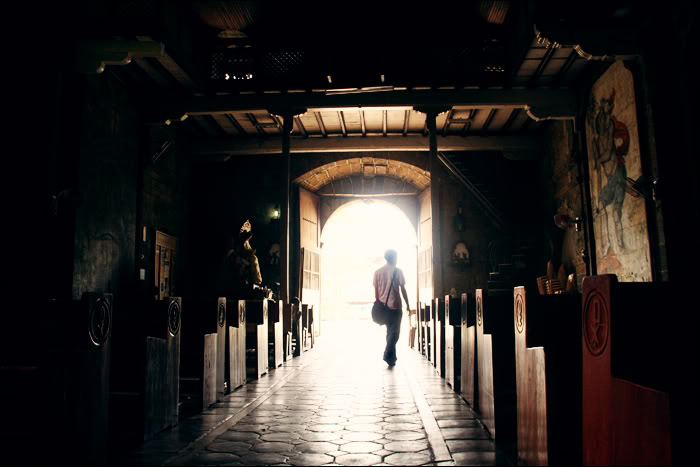Catholics Come Home: Part 3
Over the last two days I have briefly shared a portion of my faith journey. During this retelling I have particularly focussed upon my ecclesiastical wanderings, mentioning some of the things which pushed me away from some congregations and drew me towards others.
As I mentioned in the initial post, this blog series was originally a talk I gave at my parish called “Catholics Come Home”. As part of my preparation I spent quite some time on the Internet reading the stories of those who had left the Catholic Church. It was a heartbreaking experience. A large number of the stories I read echoed my own. Many of the sentiments expressed were also very similar. It became clear that, more often than not, the reason someone leaves the Catholic Church is because of lack of pastoral care, rather than doctrine.
In the accounts I read, there were many complaints about the welcome experienced when attending a Catholic parish (or rather, the distinct absence thereof). Many stories were told of abysmal music and of incoherent, boring preaching. There were laments concerning the lack of community and the lack of ongoing Christian formation. There were also unfortunately quite a few incidents described where people felt poorly treated by priests, catechists and other parish staff. Careless words can cut extremely deep and have serious consequences..

The Challenge
I began this series by quoting a series of statistics concerning Catholicism in the United States. There was one important statistic, however, which I omitted. Of those in the US who profess to be Catholic, only 23% regularly go to Mass. The US Council of Catholic Bishops recognized an important point concerning this:
“Those 77% absent from the eucharistic feast each week are not strangers: They are our parents, siblings, spouses, children and friends” – USCCB Committee on Evangelization and Catechesis
So, what can be done to draw these people back to the Sunday liturgy and the practice of their faith? Over the next few days I would like to distill the experiences of my own wanderings into a list of suggestions. It is my hope that these suggestions might help you guide those you love and encourage them to come home to the Catholic Church.
1. Know your faith
Before one can evangelize, one must be evangelized. In his Apostolic Exhortation, Pope Paul VI wrote:
“[The church] has a constant need of being evangelized, if she wishes to retain freshness, vigor and strength in order to proclaim the Gospel“ – Evangelii Nuntiandi, 15
There is an old Latin phrase “Nemo dat quod non habet” which means that you can’t give what you don’t have. This is why we must first know our faith before we can share it with others.
2. Be a life-long disciple
At no point should we ever think that our formation is over.There’s obviously a lot more which could be written on this subject and, honestly, it goes far deeper than we could say here. At this point in Church History we have had decades of either substandard or non-existent catechesis.
However, we have not “arrived” this side of Heaven. There is always more to learn and, as Frank Sheed said, each new thing we learn about God is just one more reason to love Him.
3. Know Sacred Scripture
Catholics are stereotyped as not knowing the Bible. It’s high time this stereotype was obliterated. The Early Church Father and biblical scholar, St. Jerome, gave this pithy truism:
“Ignorance of Scripture is ignorance of Christ” – St. Jerome
I remember being horrified by the complete ignorance of Scripture often demonstrated by many Catholics. If Catholics wish to draw non-Catholics to the Church they must love the Bible just as much as, if not more than non-Catholics. Here is what the Second Vatican Council said about Sacred Scripture:
“The Church has always venerated the divine Scriptures as she venerated the Body of the Lord… the Word of God…[serves] the children of the Church as strength for their faith, food for the soul, and a pure and lasting fount of spiritual life” – Dei Verbum, 21
So, I’d invite you to join a Bible Study group, purchase some study materials and, most importantly, spend time each day privately reading the Sacred Scriptures.
4. Receive the Sacraments
Draw upon all the sources of grace available. It is the food for the journey. We should be nurturing our love for the Eucharist, “the medicine of immortality”, as the First Century martyr and Bishop, St. Ignatius of Antioch, described it. One can endure all the more easily terrible music, troublesome parishioners and boring preaching if only one truly loves this “gift of God” (Ibid).
I’ll pick this up again tomorrow…
Part 1 | Part 2 | Part 3 | Part 4 | Part 5 | Part 6
The article Catholics Come Home: Part 3 first appeared on RestlessPilgrim.net
Pingback: Catholics Come Home: Part 3 CATHOLIC FEAST